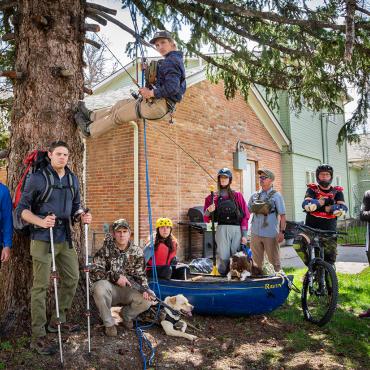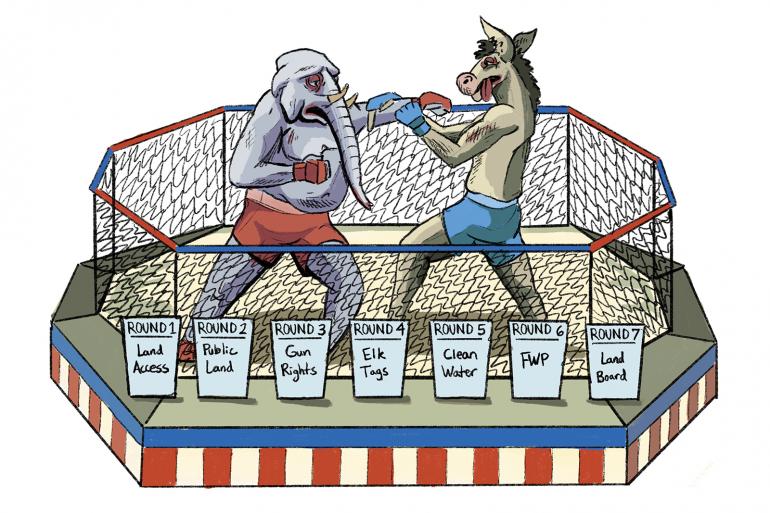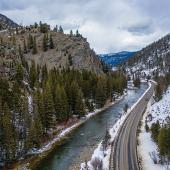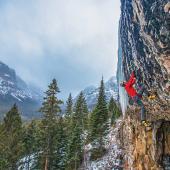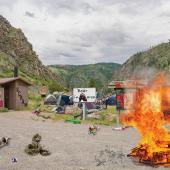Punch Your Ticket
Which candidates support wildlife, recreation, and conservation?
By now you’ve seen or heard all the political ads. Heck, they’d be hard to miss. Montana politicians are locked in some tight races, both for seats in Congress and for local positions, like governor and attorney general. But with such brutal smear campaigns on both sides, it can be tough to know where candidates stack up on issues that are important to hunters, anglers, and recreational users of all types. Here’s a rundown on four high-stakes races, and where the candidates stand.
US Senate: Jon Tester vs. Tim Sheehy
Born in Havre and raised on a farm outside Big Sandy, Jon Tester was first elected to the senate in 2006, and has a track record of fighting for conservation. Namely, he’s been responsible for the Yellowstone Gateway Protection Act, which safeguards 30,000 acres of public lands near Yellowstone Park from mining; and for repeatedly introducing the Montana Headwater Legacy Act, which would designate parts of the Gallatin, Madison, and Smith rivers as “Wild & Scenic.” Currently, he’s leading the Blackfoot Clearwater Stewardship Act through the Senate, which aims to protect 80,000 acres of land in northwest Montana, including major tributaries to the Blackfoot River while revitalizing logging in the Seeley Lake area. He’s also consistently voted in favor of public opportunity on wildlife-related bills.
In the opposing corner is Tim Sheehy, multi-millionaire founder of Bridger Aerospace, the private wildland-firefighting company based in Bozeman. Sheehy grew up in Minnesota—which isn’t inherently an issue (not many of us are actually from Montana)—but what is an issue is his snubbing of Montana culture, namely public access. In the past, he’s voiced support for turning over federal land to state, or even county, ownership. What’s more, he doesn’t allow free public hunting on his own sprawling ranch near Lewistown, although he does offer expensive trophy-elk hunts to paying clients. So we can pretty much guess where his loyalties will lie if he wins the Senate seat—and it won’t be with the average Jane & Joe hunter, angler, or other type of outdoor recreationist.
US House: Ryan Zinke vs. Monica Tranel
After leaving Congress to serve as Secretary of the Interior in the Trump administration, Ryan Zinke quickly made enemies in the conservation community with a series of secretarial orders unfavorable to wildlife. Last year he made it back to the House of Representatives, and this time he introduced a bill blocking a BLM rule that improves conservation on public land. However, this spring and summer, he introduced two pro-wildlife and pro-public-lands bills. His Public Lands in Public Hands bill would require congressional approval to dispose of certain publicly-accessible federal land, while the Wildlife Corridors on Working Lands Act would incentivize ranchers to increase habitat connectivity. Only time will tell if the old Zinke is gone for good, or just in hiding until election day.
Running against Zinke, for the second time, is Missoula-based lawyer Monica Tranel. She was raised on a ranch in eastern Montana, and now specializes in litigating utility and energy issues. A former Olympic rower, Tranel’s positions generally mirror the run-of-the-mill Democratic national platform, and she’s quick to highlight her problem-solving approach to issues. Tranel says she’ll fight for public lands, and points to Tester as someone she admires in Congress. She’s not one for BS, and it’s a safe bet on how she’ll side on conservation issues if she wins the seat. She sure won’t be riding into DC on a horse, like Zinke’s been known to do—but how cool would it be if she rowed in, along the Potomac River?
MT Governor: Greg Gianforte vs. Ryan Busse
If you’re a out-of-state landowner in Montana, you probably love Greg Gianforte. In the last state legislative session, he created a nonresident landowner preference pool for big-game hunting tags and sided with efforts to privatize the state’s wildlife resources. He also vetoed a bipartisan bill that sought to reallocate marijuana taxes to habitat-improvement projects, public-lands access, veteran services, and county-road maintenance. Throw in a few embarrassing foibles, such as his killing of collared animals, and he’s been mostly bad news for local Montana hunters. In fairness, the man has voted in favor of numerous land-acquisition projects, unlike his equally conservative attorney general (see below). More public land means more access and outdoor opportunities, sure—but it’s not quite enough to undo all the other wrongs.
Although Gianforte seems to work against the efforts of Montana FWP, Ryan Busse claims to fully support the agency, and even wants to build it up. Running as a Democrat, he’s a former Republican with a long history as a firearms executive; he ultimately left the industry after realizing it and the Republican party were fundamentally at odds with his beliefs—not least of which is the importance of public land, water, and resources. Still, he vows to protect gun-owners and hunting rights (he’s a hunter and shooter himself), while also fighting for public access. Montana has had no problem electing pro-access Democratic governors in the past—but will Busse be another Steve Bullock, who fought tooth and nail for the people, or a Brian Schweitzer, who was mostly pomp & circumstance? Only time will tell.
Attorney General: Austin Knudsen vs. Ben Alke
Incumbent Austin Knudsen is up for re-election, and it’s high time he gets replaced. As a member of the state Land Board, he was the lone dissenting vote in the acquisition of a 5,700-acre property in the Big Snowy Mountains, set to become a Wildlife Management Area. FWP has an “empire-building” problem, he claims, despite said “empire” providing outdoor opportunities for every citizen in the state, as opposed to private empires which exclude all but the rich. As if that wasn’t enough, Knudsen has repeatedly stalled on investigating pollution issues in the Gallatin, neglecting his job duties as attorney general.
Ben Alke, on the other hand, has a track record of standing tall on behalf of the Montana people, and has 17 years of law experience here in the state (currently, he’s working for a Bozeman-based law firm). With regards to the AG’s vote on the state’s Land Board, he says, “The Board should prioritize increasing funding for public education and access to public lands.” Sounds like music the ears of sportsmen—and more importantly, we already know how Knudsen votes on public-land acquisitions, and it can’t get much worse. While the position would be a major step up in responsibility for Alke, he seems like a competent guy. What do we have to lose?


